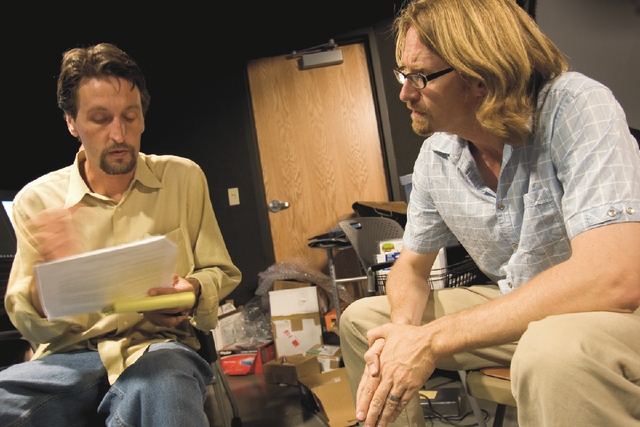Curtis Bennett was too analytical for fine art school. At least, that’s what they told him. They said he needed to think less to be a graphic artist. He needed to let the art flow. So he did … right out of fine arts and straight into computer science.From there, Bennett worked hard to graduate Magna Cum Laude from Oklahoma State University with a degree in computer science. Then it was off to Albuquerque to pursue a master’s degree and a slightly unexpected career path. While videogame development wasn’t officially part of UNM’s curriculum, Bennett signed up for a special topics class on advanced graphic design and game development. There, his analytical brain and his artistic vision met in the form of a race car on virtual track steered by a force-feedback robotic arm.“I always thought game programming would be a lot of fun,” he says. Now, Bennett works full-time for Abalone Studios developing virtual training programs—called “serious games”—for the U.S. Military.Abalone Studios is one of many local companies devoted to game development based in the Duke City. Bill Klein is the president of Extreme AI, a game development company founded in Albuquerque in 2003 and specializing in mobile devices. Klein and his team are currently working on a cell phone-based game part Da Vinci Code , part treasure hunt, as Klein likes to describe it. Players will be sent to various parts of the city for clues or asked to answer riddles in an effort to solve a year-long mystery. While the game hasn’t yet officially launched, the company is already drumming up a buzz on its website, www.extremeai.com.Creating a local gaming industry is what Eric Whitmore, program coordinator of the UNM ARTS Lab and Arts Technology Center, is all about. The ARTS Lab has been offering classes in videogame development for the past few semesters. Whitmore and Ed Angel, director of the ARTS Lab, also work closely with the Duke City Shootout, a local competition in which filmmakers are given only seven days to shoot a movie. Taking inspiration from the successful event, Whitmore began planting the seed for a videogame design competition in the same vein. Thus, Gameslam came to be.The objective for Gameslam was simple enough to define: Provide an opportunity for budding game designers to learn about and develop their craft. Just as one might send a college-bound son to business camp, encouraging him to pursue his master’s in business administration, or a daughter determined to play for the WNBA to a seminar featuring Sue Bird for firsthand knowledge of what it takes to make a team, Whitmore wants to give those kids smashing buttons in front of the TV screen a way to turn their hobby into a career—the dream of everyone who’s ever held a job.Gameslam will be held in conjunction with the Duke City Shootout in the Insomnia Lounge in the Sendero Ballroom of the Hyatt Regency Downtown. Similar to the Shootout, Gameslam participants will be given five days to create a piece of work before it is presented to a panel of judges. In this case, the novice game designers (mostly high school and college aged) will not be required to program an entire game, a process which could take years. Instead they will create a detailed proposal for their own original game based on a provided topic. Participants first attend two days of workshops in topics ranging from digital storytelling to the programming tool XNA to game design in the age of cell phones. Over the last three days, they’ll use their new knowledge to write a game proposal ending in a round table with the judges in which the developers aim to convince the judges their game will be bigger than World of Warcraft and Halo combined.“We’re interested in building a local game industry,” Whitmore says. To boost the local scene, the judges and workshop presenters will be industry members from Albuquerque, such as Klein from Extreme AI, Bennett from Abalone Studios and more. “We’re trying to build a network of people who would hopefully be part of the gaming industry here in the state,” he says.Whitmore likens the efforts of Gameslam and the ARTS Lab to that of the New Mexico Film Office, only Gameslam develops up-and-coming game designers instead of filmmakers. “We’re trying to get games moving in the state,” he says. They are taking the successful elements used in building the film industry locally—like inviting large, successful companies into the state and cultivating potential employees armed with design and development skills–and applying them to the gaming industry, he says. And with classes at UNM and CNM being offered in videogame development and advanced graphic design, the pool of qualified individuals is primed to grow. As the pool grows, so does the industry. As the industry grows, so does the opportunity for local designers like Curtis Bennett—a former student of the ARTS Lab’s game design class.“I love my job,” Bennett says, and the class at UNM helped him get it. By teaching him how to use his skills in computer science and graphic design, the demo games Bennett created over the course of the semester gave him a tangible example of his abilities as a designer. This fall, Bennett will be teaching his own course at CNM in game programming open to anyone of any ability interested in videogame technology—opening more doors for button smashers to morph from game consumers to game creators.
For more details about Gameslam, visit artslab.unm.edu/gameslam. Budding game developers ages 16 and above are encouraged to apply by July 17.










